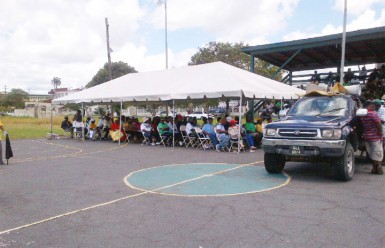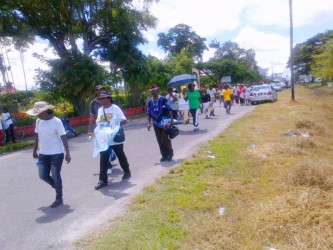The Coalition for the 1823 Parade Ground Monument yesterday held a ‘Remembrance Walk/ Freedom Walk’ in honour of the 1823 martyrs from Le Ressouvenir, East Coast Demerara as the group signalled its determination to build a monument to the martyrs at Parade Ground.
The walk from Le Ressouvenir to the Parade Ground, which saw the participation of about 100 persons, culminated in a small rally. ‘No longer are we bound, we building on Parade Ground’ and ‘We must build our monument without torment.

Our ancestors fought for it, PPP/C must respect it’ were among the chants of the marchers as they peacefully walked through various city streets. The Coalition had previously said that Le Ressouvenir is the location where the fight for freedom by slaves started and the Parade Ground is the location where the revolutionaries were executed following mock trials. The group had also stated that August 18th was chosen as the day for the walk because the rising in 1823 started on August 18. The walk was in memory of the rebels’ heroic sacrifice; to sensitise the public about the rebellion in 1823; to publicise the intention of the Coalition to build the 1823 Monument at the Parade Ground; and to insist that those in authority respect the rights of all ethno-cultural groups in Guyana.
The group was formed late last year after government announced its intention to have the monument on Seawall Road and not Parade Ground where the slaves were hanged and where many African groups-including the African Cultural and Development Association (ACDA)-felt it should be built. However, government went ahead with the $26 million monument at the seawall and it was commissioned last week.
Executive member of the Coalition, Melissa Ifill said yesterday’s march was significant because it signals the intention of the African-Guyanese community to take charge of their lives, the way in which their stories are told and how their heroes are represented.
Ifill said that she was pleased with the number of persons who turned out which she described as very positive and said it suggests that the African-Guyanese community is “interested in our own history, lives, culture and the direction in which we take.” Ifill said that the march was about sensitising the wider community of the group’s intention to build a monument but they also wanted them to buy into the project in an effort for it to become a people’s monument. “It was also to send a signal to the powers-that-be of our intention to construct a monument here and about our determination,” she said.
Former parliamentarian and member of the PNCR Aubrey Norton said yesterday’s march brought people together and it is expected that it will raise consciousness about the events of 1823. “It is an indication that people are awakening and understanding the realities of Guyana and recognize that you have to struggle for what you want, nobody is going to give to you.
Anyhow if people give anything to you they can take it back when they want but when you struggle [it is yours],” Norton said.

He said the good turnout also demonstrates that many persons believe that the government “eyes pass the African-Guyanese people” by not building the monument at Parade Ground where their ancestors were hanged. “This is a statement that Parade Ground is the place where the monument should be,” he said adding that government needs to understand that people are not going to accept things being dictated to them. He pointed out that all ethnic groups have their ideas and interests and they want them to be realized within the context of consensus rather that domination.
Asked how soon a monument on Parade Ground could become a reality, Norton said the ground itself is a monument because historically that is the place where the slaves were hanged and their heads displayed. However, he said, the mechanisms are being put in place to build a monument and a park “even if it takes 20 years” since it is a responsibility that they have undertaken and it will be done.
“I want to make it clear that this is nothing about ethnic fight, the 1823 group believes that all Guyanese are equal and should be treated equally but we abhor the fact that the government attempts to treat African-Guyanese as if they are not part of [this country],” he added.
Norton said he does not believe government’s decision to build the monument on Seawall Road, opposite Camp Ayanganna, was done in consultation with its support base which he believes is alienated from the ruling party.
Meantime, historian Dr. David Hinds said that the walk is significant in light of the fact that there has not been a march in the city in a long time. “This march is important; for one thing that we have taken the public space and come out here this morning and marched and showed that we are concerned about what is happening in the country and we are using the opportunity of this anniversary of the 1823 rebellion…to draw attention to what is happening in the country today,” Hinds said. He added that the slaves would have stood up for equality, freedom and justice in 1823 and those issues are still with Guyanese today and the group feels that it is a start to demonstrate to Africans that they can do things to address the situation.
“Whenever a society stops protesting and stops resisting, it is dead. Think if our fore-parents did not protest and resist against slavery, you might have still been enslaved today.
Freedom concedes nothing without a struggle and so therefore we are concerned that our people are not called upon to struggle,” he said.
Importantly, Hinds said the protest was not organized by politicians but rather ordinary people engaging in self-activity for their own self-emancipation.
He hopes that yesterday’s march was the beginning of a prolonged resistance since after 21 years in power the government has shown no sign of sitting down and solving the deep seated problems that face the country.
“I think if the politicians want to continue to talk, that is their problem. We are intent on mobilizing our people to fight in their own interest. For me this is about abandoning the politicians and organizing outside…in our own names because our politicians are failing us in terms of involving our people…” he said.
Hinds also pointed out that the march was peaceful and no one was beaten or property damaged which has been the claim by many that whenever there is a march, there is violence.




